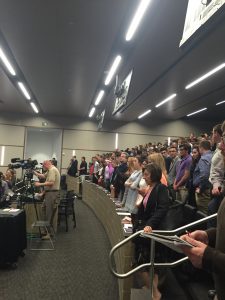Illinois Supreme Court hits the road for session at Benedictine University
Cathy Janek — June 1, 2016

A photo of the audience at the Illinois Supreme Court’s recent oral hearings at Benedictine University. The Court held a rare session outside its usual Springfield and Chicago chambers and was the first time they were heard at an educational institution. (Photo by Cathy Janek / for Chronicle Media)
Emily Miller spent her first morning following graduation from Naperville Central High School inside a Benedictine University (Benedictine University) auditorium listening to legal arguments.
Even though Miller hadn’t slept the night before, she was still determined to attend a recent special session of the Illinois Supreme Court held at the school’s Daniel Goodwin Hall of Business.
Active in Naperville Central’s Youth and Government club, it was an experience she didn’t want to miss.
“I like to argue,” said Miller, who was accompanied follow classmates and Donna Mohn, Naperville Central social studies teacher and Youth and Government club advisor.
Naperville Central junior Sara Campbell, who once presented oral arguments during a mock trial in the courtroom of the Illinois Supreme Court in Springfield, was especially interested to see the seven Illinois Supreme Court justices in action.
Formal oral arguments were held at Benedictine in an effort to make the judicial branch of the Illinois government “more accessible and transparent,” as well as offer an educational aspect, Illinois Supreme Court Justice Rita B. Garman said.
“The court only on rare occasion has gone outside our venue of our Supreme Court building in Springfield, Illinois, but we decided to come to DuPage County,” she said.
The court — comprised of four men and three women — typically doesn’t convene outside of Springfield or Chicago. The recent arguments at Benedictine University marked the first time they were heard at an educational institution.
The last time the Illinois Supreme Court heard arguments outside of Springfield was in May 2014 when it held a session at the Third District Appellate Courthouse in Ottawa.
Due to restoration work done on the 110-year-old building in Springfield, the Court also heard arguments in its Chicago courtroom for five terms from September 2013 to May 2014.
Benedictine’s 600-seat auditorium was filled with students from many local area high schools who were selected by their teachers to attend. Other attendees included local political figures and interested citizens who arrived early to be assured a seat.
Arguments were heard in two separate cases—People v. Mark Minnis and Randall W. Moon, etc., v. Clarissa F. Rhode.
Unlike a normal courtroom setting, once the justices left the courtroom, lawyers in the represented cases answered questions and listened to comments from audience members who lined up at two microphones.
Many of the follow-up questions surrounded the case of the People v. Mark Minnis. In the case, Minnis was charged with violating the Sex Offender Registration Act for failing to disclose his Facebook page to which he made posts.
In this case, the State appealed the trial court’s ruling which found that the statute is unconstitutional, determining the statutory requirement is overly broad as it has no limitations on the type of speech or communication that the offender is required to report and register.
The other case, Randall W. Moon, etc., v. Clarissa F. Rhode, involved the statute of limitations involved in a wrongful death case.
After a lower court ruled in favor of the defendant, this case was brought to the Illinois Supreme Court.
The plaintiff argued that the statute of limitations should be extended due to “discovery rule” which states that the statute of limitations period does not begin until the plaintiff is aware or should be aware that he or she has an actionable claim.
Addison Trail High school junior Ryan Cabildo said hearing arguments in front of the Illinois Supreme Court was “a unique opportunity he did not want to miss.”
Fellow Addison Trail junior Alex Gunnerson who is involved in the Model UN and the high school debate team said he “enjoys learning about the government process.”
Both said that the detailed nuances involved with arguing court cases were especially interesting.
A recent University of Pittsburgh law graduate, Woodridge resident Tanvi Potdukhe came to hear the oral arguments with her sister, Trupti Potdukhe, who is a sophomore at Benedictine University.
Returning home to take the bar exam, Potdukhe hopes to practice law in Illinois and someday maybe even argue a case before the Illinois Supreme Court.



